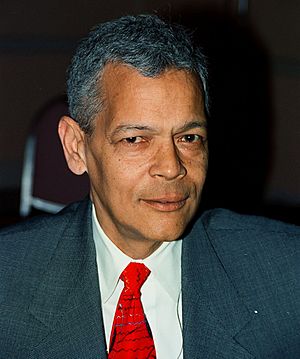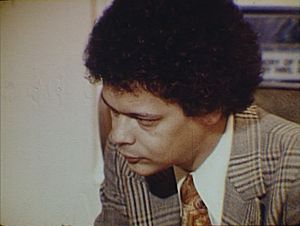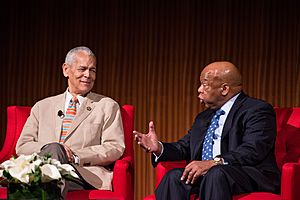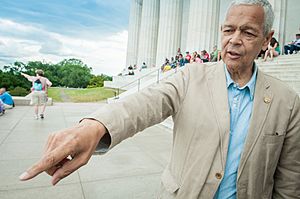Julian Bond facts for kids
Quick facts for kids
Julian Bond
|
|
|---|---|
 |
|
| Chairman of the National Association for the Advancement of Colored People | |
| In office 1998–2010 |
|
| Preceded by | Myrlie Evers-Williams |
| Succeeded by | Roslyn Brock |
| Member of the Georgia State Senate from the 39th district |
|
| In office January 13, 1975 – January 12, 1987 |
|
| Preceded by | Horace Ward |
| Succeeded by | Hildred Shumake |
| Member of the Georgia House of Representatives | |
| In office January 9, 1967 – January 13, 1975 |
|
| Succeeded by | Mildred Glover |
| Constituency | 136th district (1967–1969) 111th district (1969–1973) 32nd district (1973–1975) |
| Personal details | |
| Born |
Horace Julian Bond
January 14, 1940 Nashville, Tennessee, U.S. |
| Died | August 15, 2015 (aged 75) Fort Walton Beach, Florida, U.S. |
| Political party | Democratic |
| Spouses |
Alice Clopton
(m. 1961; div. 1989)Pamela Horowitz
(m. 1990) |
| Children | 5 |
| Education | Morehouse College (BA) |
Horace Julian Bond (January 14, 1940 – August 15, 2015) was an American social activist, leader of the civil rights movement, politician, professor, and writer. While he was a student at Morehouse College in Atlanta, Georgia, during the early 1960s, he helped establish the Student Nonviolent Coordinating Committee (SNCC). In 1971, he co-founded the Southern Poverty Law Center in Montgomery, Alabama, and served as its first president for nearly a decade.
Bond was elected to serve four terms in the Georgia House of Representatives and later he was elected to serve six terms in the Georgia State Senate, serving a total of twenty years in both legislative chambers. Following his career in the legislature, he was a professor of history at the University of Virginia from 1990 to 2012. From 1998 to 2010, he was chairman of the National Association for the Advancement of Colored People (NAACP).
Contents
Early life and education
Bond was born in 1940 at Hubbard Hospital in Nashville, Tennessee, to parents Julia Agnes (née Washington) and Horace Mann Bond. His father was an educator, then president of Fort Valley State College. His mother, Julia, was a former librarian at Clark Atlanta University, also a historically black college.
The family resided on campus at Fort Valley State College. The house of the Bonds was a frequent stop for scholars, activists, and celebrities passing through, such as W. E. B. Du Bois and Paul Robeson.
In 1945, Bond's father accepted the position of president of Lincoln University, where he was its first African-American president, and the family moved North.
In 1957, Bond graduated from George School, a private Quaker preparatory boarding school near Newtown in Bucks County, Pennsylvania. He started attending Morehouse College, a historically black college in Atlanta, Georgia.
Political organizing
On April 17, 1960, Bond helped co-found the Student Nonviolent Coordinating Committee (SNCC).
Bond left Morehouse College in 1961 to work on civil rights in the South. From 1960 to 1963, Bond led student protests against segregation in public facilities and other Jim Crow laws of Georgia. From January 1961 to September 1966, he served as the communications director of SNCC. During this period, he traveled frequently in Georgia, Alabama, Mississippi, and Arkansas to help organize civil rights and voter registration drives.
At age 31, Bond returned to Morehouse College in 1971, to complete his Bachelor of Arts in English.
With Morris Dees, Bond helped found the Southern Poverty Law Center (SPLC), a public-interest law firm based in Montgomery, Alabama. Bond served as its president from 1971 until 1979. Bond was an emeritus member of the Southern Poverty Law Center board of directors at the time of his death in 2015. Bond also advocated for Africans in Europe.
Career
In politics
In addition to his organizing, Bond ran for political office in Georgia. In 1965, he was one of 11 African Americans elected to the Georgia House of Representatives. They were aided by expansion of the franchise for blacks in the state, who largely supported Democratic Party candidates, after national passage of the Civil Rights Act of 1964 and Voting Rights Act of 1965. The latter especially had brought federal oversight to enforce the constitutional rights of blacks to vote. As states ended discriminatory practices in voter registration, African Americans regained the ability to vote and entered the political process.
Although initially undecided about his party affiliation, Bond ultimately ran and was elected as a Democrat, the party of President Lyndon B. Johnson, who had supported civil rights, and signed the Civil Rights Act and Voting Rights Act into law. On January 10, 1966, Georgia representatives voted 184–12 not to seat Bond after the election, because he had publicly endorsed SNCC's policy of opposition to United States involvement in the Vietnam War. Five of the representatives who did vote to seat Bond were white, including Republican Rodney Cook. They disliked his stated sympathy for persons who were "unwilling to respond to a military draft."
Bond took the legislature to court. A three-judge panel of the United States District Court for the Northern District of Georgia ruled in a 2–1 decision that the Georgia House had not violated any of Bond's constitutional rights. The case reached the Supreme Court of the United States in 1966, which ruled 9–0 in the case of Bond v. Floyd (385 U.S. 116) that the Georgia House of Representatives had denied Bond his freedom of speech and was required to seat him. From 1967 to 1975, Bond was elected to four terms in the Georgia House, where he organized the Georgia Legislative Black Caucus.
In January 1967, Bond was among eleven Georgia House members who refused to vote when the legislature elected segregationist Democrat Lester Maddox of Atlanta as governor of Georgia over the Republican Bo Callaway. Callaway had led in the 1966 general election by some three thousand votes. Under the Georgia Constitution of 1824, the state legislature had to settle the election because neither major party candidate had polled a majority in the general election. Former Governor Ellis Arnall polled more than fifty thousand votes as a write-in candidate, a factor which led to the impasse. Bond would not support either Maddox or Callaway, although he was ordered to vote by lame duck Lieutenant Governor Peter Zack Geer.
Throughout his House career, Bond had to deal with repeated redistricting of his district by the state legislature:
- 1967–1969: 136th
- 1969–1973: 111th
- 1973–1974: 32nd
Bond was elected in 1974 for the first of six terms in the Georgia Senate, where he served from 1975 to 1987.
During the 1968 presidential election, Bond led an alternate delegation from Georgia to the Democratic National Convention in Chicago. There he was the first African American to have his name entered into nomination as a major-party candidate for Vice President of the United States. The 28-year-old Bond quickly declined, citing the constitutional requirement that one must be at least 35 years of age to serve in that office.
Bond ran for the United States House of Representatives from Georgia's 5th congressional district (encompassing Atlanta) in 1986. He lost the Democratic nomination in a primary runoff to rival civil rights leader John Lewis in a bitter contest.
While Bond had raised twice as much money as Lewis and had a larger national reputation, Lewis cast himself as the man on the front lines of the Civil Rights Movement and ran up large margins over Bond among white liberals in Atlanta. As the district had a very large Democratic majority, winning the Democratic primary meant that Lewis was almost certain to win the general election. After he did so, he served in Congress for 30 years until his death on July 17, 2020.
Bond resigned from the Georgia Senate the following year. After leaving politics, Bond taught at several universities in major cities in the North and South, including American University, Drexel, and Harvard.
Bond taught the history of the civil rights movement at the University of Virginia from 1990 to 2012. While there he shared his experiences of the movement with thousands of students through stories, newsreels, music, and film. Bond was on the Board of Selectors of Jefferson Awards for Public Service.
In activism
Bond became the first president of the Southern Poverty Law Center in 1971. He served until 1979, remaining a board member and president emeritus for the rest of his life.
In 1998, Bond was selected as chairman of the NAACP. Bond once referred to leading the NAACP as "the most powerful job a Black man can have in America." In November 2008, he announced that he would not seek another term as chairman. Bond agreed to stay on in the position through 2009, as the organization celebrated its 100th anniversary. Roslyn Brock was chosen as Bond's successor on February 20, 2010.
Bond was also an outspoken supporter of the rights of gays and lesbians. He publicly stated his support for same-sex marriage. Most notably, he boycotted the funeral services for Coretta Scott King on the grounds that the King children had chosen an anti-gay megachurch as the venue. This was in conflict with their mother's longstanding support for the rights of gay and lesbian people.
In a 2007 speech on the Martin Luther King Day Celebration at Clayton State University, Bond said, "If you don't like gay marriage, don't get gay married." His positions pitted elements of the NAACP against religious groups in the Civil Rights Movement who oppose gay marriage. Most resistance came from within the Southern Christian Leadership Conference (SCLC), which was partially blamed for the success of the gay marriage ban amendment in California. On October 11, 2009, Bond appeared at the National Equality March in Washington, D.C., and spoke about the rights of the LGBT community, a speech that was aired live on C-SPAN.
Bond was a strong critic of policies that contribute to anthropogenic climate change. He was among a group of protesters arrested at the White House for civil disobedience in opposition to the Keystone XL pipeline in February 2013.
Other political views
Bond was a strong critic of the George W. Bush administration, in large part because he believed it was illegitimate. Twice in 2001, first in February when he spoke to the NAACP board and then in July when he spoke at that organization's national convention, he attacked the administration for selecting Cabinet secretaries "from the Taliban wing of American politics". Bond specifically criticized Attorney General John Ashcroft, who had opposed affirmative action, and Interior Secretary Gale Norton, who defended the Confederacy in a 1996 speech on states' rights. In the selection of these individuals, Bond said, Bush had appeased "the wretched appetites of the extreme right wing and chosen Cabinet officials whose devotion to the Confederacy is nearly canine in its uncritical affection". House Majority Leader Dick Armey responded to Bond's statement with a letter in which he accused NAACP leaders of "racial McCarthyism". Bond later said at the annual NAACP convention that year, that since Bush's election, he had "had his picture taken with more black people than voted for him."
On May 14, 2013, while appearing on MSNBC, Bond called the Tea Party the "Taliban wing of American politics". It was under review by the IRS. Bond told MSNBC, "I think it's entirely legitimate to look at the Tea Party." But he also said, "It was wrong for the IRS to behave in this heavy-handed manner. They didn't explain it well before or now what they're doing and why they're doing it." He called Tea Party members "a group of people who are admittedly racist, who are overtly political, who've tried as best as they can to harm President Obama in every way they can". He added, "We all ought to be a little worried about them."
Work and appearances in media
In 2012, Bond was featured in Julian Bond: Reflections from the Frontlines of the Civil Rights Movement, a documentary film by Eduardo Montes-Bradley.
From 1980 to 1997, Bond hosted America's Black Forum. He was also a commentator for radio's Byline and NBC's The Today Show. He authored the nationally syndicated newspaper column Viewpoint, and narrated the critically acclaimed PBS series Eyes on the Prize in 1987 and 1990.
Bond hosted Saturday Night Live on April 9, 1977, becoming the first black political figure to do so. In the same year, he also appeared in the Richard Pryor vehicle Greased Lightning. In 1978, Bond played himself in the miniseries King. He also had a small appearance playing State Representative John E. White in the movie Ray (2004), and played himself in the movie 5 to 7 (2014).
Personal life and death
On July 28, 1961, Bond married Alice Clopton, a student at Spelman College. They had five children: Phyllis Jane Bond-McMillan, Horace Mann Bond II, Michael Julian Bond (an Atlanta City councilman), Jeffrey Alvin Bond, and Julia Louise Bond. They divorced on November 10, 1989.
In 1990 Bond married Pamela Sue Horowitz, a former SPLC staff attorney. Bond died from complications of vascular disease on August 15, 2015, in Fort Walton Beach, Florida, at the age of 75. He is survived by his wife, his five children, and eight grandchildren, and his brother James and sister Jane Bond Moore.
Awards and honors
- 2002, he received the National Freedom Award, from the National Civil Rights Museum.
- 2006, he was awarded the National Leadership Award, from the National LGBTQ Task Force
- 2009, he was awarded the Spingarn Medal, from the NAACP.
Among 25 honorary degrees, he was awarded:
- 1999, an honorary LL.D. from Bates College.
- 2008, an honorary degree from George Washington University. Bond was also the 2008 Commencement Keynote Speaker.
- 2009, an honorary L.H.D. from Macalester College.
- 2015, an honorary L.H.D. from Skidmore College.
See also
 In Spanish: Julian Bond para niños
In Spanish: Julian Bond para niños




